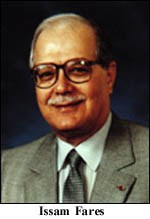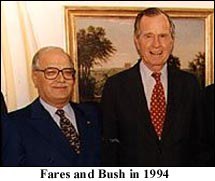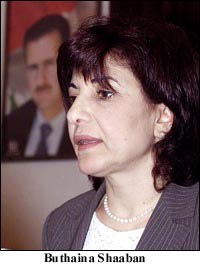 |
| Vol. 5 No. 11 | Table of Contents MEIB Main Page |
November 2003 |
|
|
Dossier: Issam Fares |
 |
In reality, however, Fares is less the powerbroker he is often hyped to be than an opportunistic middleman. One by one, to the chagrin of Damascus, his closest political allies in the United States have abandoned their opposition to sanctions against Syria in recent weeks.
Background
Issam Fares, a Greek Orthodox Christian, was born in 1937 in the northern Lebanese town of Bayno. Although raised in a farming region, Fares dreamed of becoming a merchant. At the age of 17, he began working as a clerk for a food services company, Abela Group, and was promoted steadily. After earning a business degree from Tripoli College in 1953, he moved to the Arab Gulf and became head of Abela's operations in Qatar. In the years to follow, he managed its operations in Pakistan, Kuwait, Iran, and Saudi Arabia.
In 1975, as Lebanon began its descent into civil war, Fares left Abela Group and acquired controlling interests in a diverse group of businesses that flourished during the oil boom in the Arab Gulf, such as the Netherlands-based Ballast-Nedam, which grew to become one of the world's largest construction and civil engineering firms. Through his Saudi contacts, Fares secured a number of conspicuously profitable contracts for Ballast-Nedam - most notably, the building of a bridge connecting Bahrain to Saudi Arabia. He later sold the company to British Aerospace and invested in a wide range of oil, real estate and media interests, with the Houston-based Wedge Group as his primary investment vehicle.
Back in Lebanon, Fares' home region of Akkar was heavily occupied by Syrian forces. Although preoccupied with managing and expanding his international business conglomerate, he made contact with senior Syrian military officers in Lebanon and distributed handsome bribes in order to facilitate periodic visits to Akkar for his family. Fares backed the late Phalange leader Bashir Gemayel's bid for the presidency (and contributed money to his Washington-based advocacy group, the American-Lebanese League), but he was careful to hedge his bets and developed a relationship with Maj. Gen. Ghazi Kanaan, the head of Syrian military intelligence in Lebanon.
Fares returned to Lebanon after the end of its bloody civil war in 1990, intent on converting his economic success into political power. As a Greek Orthodox Christian, Fares faced three paramount obstacles. The first is that the top three government positions in Lebanon - president, prime minister, and speaker of parliament - are constitutionally reserved for the three largest religious groups in Lebanon - Maronite Christians, Sunni Muslims, and Shiite Muslims, respectively. A member of the Greek Orthodox community, which comprises about 5% of the population, is therefore barred from this ruling troika. Greek Orthodox Christians traditionally occupy the largely ceremonial offices of deputy prime minister and deputy parliament speaker, and at least one major cabinet portfolio.
A related obstacle is that the Greek Orthodox community in Lebanon is not concentrated in any one geographical area. Unlike Druze leader Walid Jumblatt, whose constituents are heavily concentrated in two districts, an aspiring Greek Orthodox politician cannot gain political power by appealing primarily to his own sect - he must join electoral coalitions with other candidates. The fact that Fares is not from a prominent family made this even more imperative.
Fares also had to contend with the fact that rival Greek Orthodox politician Michel Murr had, by the mid-1990s, already been awarded his sect's single allotment of prize political offices - the powerful Interior Ministry - in return for his fidelity to Syria during the war years. Although Greek Orthodox Christians are a minority in his home district of north Metn, Murr's control of the Interior Ministry allowed him to skew the electoral process in his favor and win over constituents by delivering government services.
Fares' fortune nevertheless allowed him to make marginal inroads into Lebanese politics. Much like other aspiring political elites, he acquired a stake in Lebanon's audio-visual media. In 1995, he purchased a 10% share of Lebanese Broadcasting Corp. International (LBCI) in what Agence France Press called "less-than-transparent circumstances"[1] (his son, Nijad, recently purchased another 10% stake in the station). Fares also spent a considerable sum of money on charitable projects in Lebanon, especially in his home district of Akkar. His enormous financial resources made him an attractive electoral ally. In 1996, he won a seat in parliament after joining former Prime Minister Omar Karami and Maronite feudal lord Suleiman Franjieh in an electoral coalition in northern Lebanon.
However, Fares would have remained a marginal political figure - one of many returning emigrants who bought their way into parliament - had it not been for an even more powerful political asset that ingratiated him to Damascus.
Friends in Washington
As his business empire expanded after the mid-1970s, Fares came into close contact with high-ranking politicians, mostly Republicans, in the United States. In the late 1970s, for example, he purchased a majority stake in the construction company of Joe M. Rodgers, a Nashville-based businessman who became finance chairman of the Republican Party during the 1980 election campaign and was credited with raising over $100 million from 1979-1984.[2] In the late 1980s, as the Reagan and Bush administrations sought accommodation with Syria, Fares acted as an intermediary.
 |
The most visible link between Fares and the American political establishment is the Issam M. Fares lecture series at Tufts University, which he endowed in 1994. A succession of high profile American political figures have been paid handsomely to speak at the annual event, which Fares himself presides over. Bush Sr. gave the inaugural lecture in October 1994 and made it a point to praise Fares as an "exceptional man and worldwide benefactor" who "has been doing much for his homeland" and hail Syria's role in the peace process as "important to American interests." In October 1996, Baker spoke at Tufts, telling the audience that "had it not been for Syria's approval and the positive position adopted by President Assad, the peace process would not have been launched." Other prominent former US officials paid to speak include former President Bill Clinton, former Senate Majority Leader George Mitchell, and Colin Powell.
Powell's appearance as keynote speaker just days before the US presidential election in November 2000 would later ignite controversy. Powell, who reportedly received twice his usual speaking fee to give the speech, defended his decision after The Jerusalem Post broke the story in January 2001,[3] insisting that he "was a private citizen at the time."[4] But the former chairman of the Joint Chiefs of Staff during the first Bush administration had campaigned for George W. Bush and was widely assumed to be his top choice for secretary of state at the time that he gave the speech. "Anytime somebody is taking speaking fees or receiving money that comes from a source that they are going to be involved with in their official function, it is a concern," said Larry Noble, executive director of the Center for Responsive Politics, a non-partisan watchdog group.[5]
In response to allegations of influence buying, Fares boasted that "the Zionist lobby in the US and its agents in the region felt displeasure and concern that certain Lebanese and Arab personalities have a friendly relationship with some senior officials of the new American administration."[6] Astonishingly, Powell made it a point to defend Fares, telling CNN, "It's really quite sad that this gentleman's name would be sullied in [newspaper] articles."[7]
Nijad Fares
Since federal laws prohibit non-resident foreigners from directly making political contributions, Fares has relied primarily on his son, Nijad, a businessman in Houston with non-citizen permanent resident status in the US (which entitles him to make campaign donations), to buy influence in the United States. Nijad first made headlines in the United States just as the controversy over Powell's speaking fee was dying down, when it emerged that Bush's Presidential Inaugural Committee had listed a $100,000 donation from Issam Fares (the maximum amount accepted by the committee) and another $100,000 donation from Nijad Fares' Houston-based company, Link Group LLC, a manufacturer of components for water storage tanks.[8] The appearance of Issam Fares' name caused an uproar. "This is someone with a very clear political objective looking ahead at a new administration and trying to make a friendly gesture," said Larry Makinson, a senior fellow with the Center for Responsive Politics, adding that "it could affect America's foreign policy."[9]
Bush's inaugural committee subsequently declared that the donation listed as coming from Issam Fares had, in fact, come from Nijad, but The Washington Post nevertheless ran an editorial calling the donations an attempt to buy influence: "The rules may be porous enough that the son could make campaign contributions even if the father could not. But the principle is the same. A senior official of a foreign government with a major interest in U.S. foreign policy makes or has made in his name a contribution sufficiently large that there is no way it can be forgotten - and indeed, that has to be part of the intent. He sinks a hook in the people about to run the U.S. government."[10]
Nijad, for his part, gave an unlikely explanation for his decision to list the contribution in his father's name. "This was Nijad's effort to have his father recognized," said his spokesman. "He was just trying to get his dad's name mentioned in the program."[11]
Nijad has a long history of contributing to American politicians, mostly Republicans, and has made no secret of his intentions to influence American Middle East policy. In a 1996 op-ed piece, he wrote that "even modest contributions help ensure that Members of Congress and their staffs take phone calls and are more responsive to requests. Furthermore, the contributor must make explicit an interest in Middle East-related issues."[12] During the last seven years, Nijad Fares and his wife, Zeina, have made over $100,000 in individual campaign contributions to American politicians.
The leading recipient of Fares' largesse was Energy Secretary Spencer Abraham, a former senator who lost his bid for reelection in 2000. Abraham received $17,000 for his electoral campaign and political action committee from Nijad and his wife, Zeina. Moreover, the American Task Force for Lebanon, of which Nijad is a leading member and former president, donated $7,500.[13] Abraham repaid the favor during his stint in the Senate. In 2000, he helped persuade the White House and fellow congressmen to double Lebanon's annual aid package.
Others in congress involved in the appropriation of aid to Lebanon also received handsome contributions. The chairman of the Senate Appropriations Subcommittee on Foreign Operations, Mitch McConnell (R-KY), received $2,000 from Nijad and his wife. McConnell was described by one magazine as deserving a "major part of the credit" for Lebanon's FY 2001 aid increase.[14] Likewise, the chairman of the House Appropriations Subcommittee on Foreign Operations, Jim Kolbe (R-AZ), received $2,000. Rep. Joe Knollenberg (R-MI), a major sponsor of aid of Lebanon, received $7,000 from Fares and his wife. Another major recipient was Rep Marcy Kaptur (D-OH), the lead Democrat on the House Agricultural Appropriations subcommittee. In 2001, Kaptur was the chief architect of a US government aid package, consisting of $8 million and 3,250 metric tons of soybean oil, to Hezbollah-controlled south Lebanon. According to federal records, Kaptur received $6,000 from Nijad and Zeina Fares during the last three election cycles.
In addition to making sizeable (and in most cases the maximum allowable) individual contributions to these politicians, it appears that Nijad may have persuaded friends and colleagues in the Houston area to make additional contributions. During the last three election cycles, for example, Kaptur received $40,800 from other donors in Houston, mostly Lebanese-Americans - an unusually large source of out-of-state contributions for a congressional candidate. She did not receive any contributions from Lebanese-Americans in Michigan, where they comprise over 3% of the population - this was clearly a Houston-based initiative, not a broader Lebanese-American initiative.
Ambitions in Lebanon
Fares' impressive network of friends and supporters in the United States made him a valuable asset for the Syrians, giving a boost to his political ambitions. In October 2000, he was appointed deputy prime minister, a ceremonial position previously occupied by Murr, whose excesses had so alienated the public that he was forced to leave the cabinet. Although Murr's son, Elias, was allowed to replace his father as interior minister, the appointment of Fares as deputy premier was seen as something of a demotion for the Murr family.
While Fares' new position brought him into the cabinet for the first time, it carried no formal responsibilities and no control over expenditures - the lifeblood of patronage politics in Lebanon. In order to increase his influence and stature and pave the way for the next step in his political ascent (control of a major ministry) Fares would have to skillfully manage his relations with major political players in Lebanon - most notably President Emile Lahoud and his arch-rival, Prime Minister Rafiq Hariri.
Since Fares had previously aligned himself with Karami and Franjieh, his relations with the prime minister were strained from the beginning and he naturally gravitated toward Lahoud. Since most ministers in charge of economic affairs are aligned with Hariri, Fares has become an important economic advisor to the president and usually accompanies him when he travels abroad. Fares has also supported a bid by Saudi Prince Al-Walid bin Talal, who is half Lebanese, to replace Hariri as prime minister. However, his close relationship with Franjieh - health minister in the current cabinet and a presidential aspirant opposed to the extension of Lahoud's term - illustrates that his political alliances, like his investments, are diversified.
While aligning himself squarely with Damascus, Fares has been careful to hedge his bets by building close relationships with Christian religious leaders. Maronite Patriarch Nasrallah Boutros Sfeir regularly meets with Fares and uses one of his private jets when he flies abroad.
Fares has also appealed to Christian sentiments by pressing Damascus to increase the power of his largely ceremonial office. While his predecessor as deputy prime minister was allowed to sign decrees when then-Prime Minister Selim al-Hoss was out of the country, this responsibility is not formally defined under the law - Murr acted as a sort of "vice-prime minister" because of his close relationship with Damascus and Hoss.
 |
Conclusion
Although Fares has made some impressive inroads into Lebanese politics, he nevertheless remains a second-tier member of the governing elite. His big break might have come earlier this year if he had managed to prevent the White House and both houses of Congress from enacting the Syria Accountability and Lebanese Sovereignty Restoration Act. Nijad Fares made a valiant effort to do this. He was actively involved in planning public relations visits to the United States by Syrian Foreign Ministry Spokeswoman Buthaina Shaaban and even organized a gathering of Lebanese-Americans to hear her pleas for support. ATFL organized visits to Damascus by several congressional delegations to hear Syrian President Bashar Assad make his case. In September, Fares himself flew to the United States and met with Bush Sr., but to no avail - the administration of Bush Jr. announced its support for the bill the following month. Although congressmen who received contributions from Fares had initially opposed sanctions legislation following its introduction last year, all but one of them changed their positions as the bill gained steam in Congress. In fact, even ATFL assumed a "neutral" position so as not to appear ineffective in lobbying congress.
Notes
[1] "Lebanese army still deployed at TV station, holding nine employees," Agence France Presse, 15 March 2001.
[2] "Atypical Money-Raiser Delivers for the GOP," The New York Times, 30 September 1984.
[3] See Janine Zacharia, "Powell received large lecture fee from top Lebanese official," The Jerusalem Post, 7 January 2001.
[4] CNN, Inside Politics, 9 January 2001.
[5] The Jerusalem Post, 7 January 2001.
[6] The Daily Star (Beirut), 9 January 2001.
[7] CNN, Inside Politics, 9 January 2001.
[8] "Inaugural donation listing Lebanese government leader questioned," Houston Chronicle, 17 January 2001.
[9] The Wall Street Journal, 16 January 2001.
[10] "Where's the Outrage?" The Washington Post, 19 January 2001.
[11] Houston Chronicle, 17 January 2001.
[12] Detroit News, 16 December 1996.
[13] Roll Call (Washington DC), 18 January 2001.
[14] Few Surprises in Foreign Aid Bill; Lebanon Aid Upped, Washington Report on Middle East Affairs, December 2000.
[15] Al-Nahar (Beirut), 25 January 2001.
� 2003 Middle East Intelligence Bulletin. All rights reserved.